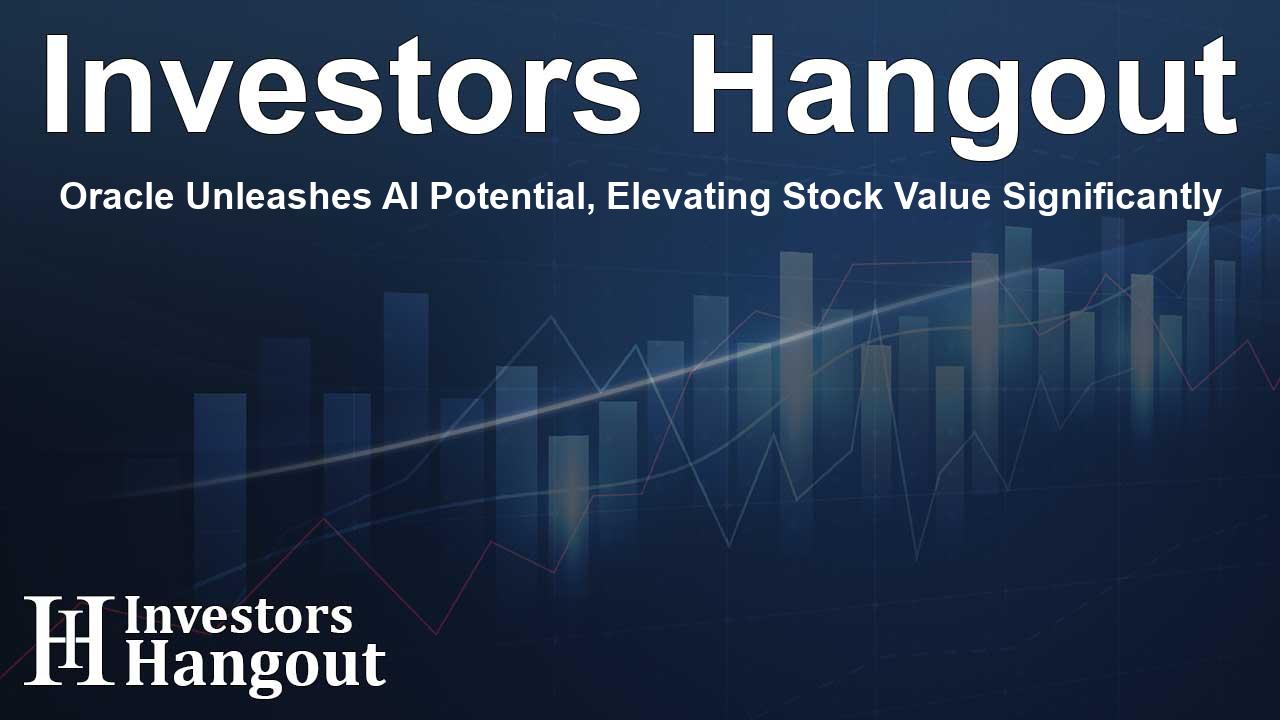Oracle Unleashes AI Potential, Elevating Stock Value Significantly

Oracle Corporation's AI Momentum Drives Growth
ELD Asset Management recently highlighted Oracle Corporation's impressive strides in artificial intelligence (AI) and its effects on stock performance. The firm believes that the latest financial results reveal a crucial phase in the AI infrastructure landscape. As Oracle's cloud services gain traction, their financial metrics indicate promising growth despite rising costs associated with scaling these operations.
Key Financial Insights from Oracle
For the first quarter of the fiscal year 2026, Oracle reported robust cloud revenue growth of 27% compared to the previous year, totaling $8.11 billion. Additionally, cloud infrastructure revenue soared by 54%, amounting to $3.72 billion. These figures underscore Oracle's ability to capitalize on increasing demand for cloud solutions as businesses pivot toward more digital frameworks.
Hybrid Cloud Services and Strategic Partnerships
Oracle's cloud services are further distinguished by their collaboration with major players, including Amazon, Google, and Microsoft, which amplified their market reach by an astonishing 1,529% in Q1 FY2026. This strategic positioning aligns with the preferences of customers, as Oracle's multi-cloud approach enhances operational flexibility and reliability.
Profit Margins and Future Outlook
During the same quarter, Oracle experienced a group revenue increase of 12% in USD terms, reaching $16.78 billion. Despite a minor earnings per share miss, with non-GAAP figures at $1.65, their GAAP earnings per share were recorded at $1.13. The overall net income stood at $3.30 billion, illustrating a robust economic foundation despite the challenges posed by increasing operational expenses of $7.03 billion.
Revenue Visibility and Capital Expenditure
Oracle’s remaining performance obligations now total approximately $455 billion, providing insights into future revenue recognition while indicating considerable contracts in place. The company reported capital expenditures of $9.57 billion, a substantial leap compared to $2.58 billion invested in the same quarter last year. This uptick highlights Oracle's commitment to fortifying its capacity to manage AI-related workloads effectively.
Maintaining Competitive Edge
As Oracle continues to navigate the complexities of AI development, its significant contract with OpenAI, estimated at around $300 billion over five years starting in 2027, will be pivotal. This relationship emphasizes a growing need for computational resources and positions Oracle as a key player in the AI landscape, though it also raises concerns about dependency on technological partners.
Market Valuation Trends
The market's response to Oracle's performance has reflected positivity, with a notable share price increase of 36% recently, boosting their market capitalization to nearly $1.25 trillion before stabilizing around $1.01 trillion. This places Oracle at a higher price-to-earnings multiple than many of its competitors, reinforcing the idea that investors are willing to price in potential AI growth within the tech sector.
Investment Implications for Institutions
For institutional investors, the focus is on long-term positioning rather than immediate market excitement. Oracle's diverse revenue channels suggest a hybrid profile, juxtaposing proven software revenue streams with a burgeoning AI infrastructure arm. Assessments will inevitably consider client dependency, operational risks, resource availability, and comparative advantages relative to peers like Amazon, Google, and Microsoft.
ELD Asset Management’s Perspective on Execution
ELD Asset Management concludes that the pathway forward hinges on Oracle's ability to successfully execute its strategy. If the company can effectively convert its contract backlog into revenue and stick to its financial plans, the earnings growth outlook appears encouraging, even amid heightened capital expenditures. The forthcoming quarters are thus crucial for assessing Oracle’s operational resilience against its continued growth narrative.
Frequently Asked Questions
What recent performance metrics has Oracle reported?
Oracle noted a 27% increase in cloud revenue and a significant jump in cloud infrastructure services by 54% for Q1 of FY2026.
How does Oracle’s partnership with OpenAI affect its strategy?
The multi-year partnership with OpenAI will generate substantial demand for Oracle's computational resources and influence future growth trajectories.
What does the future hold for Oracle’s market valuation?
Analysts suggest that Oracle's share price is likely to reflect its AI growth potential, with heightened investor interest leading to significant market capital appreciation.
Why is capital expenditure critical for Oracle's growth?
Increased capital expenditure indicates Oracle's commitment to scaling up its infrastructure to meet projected AI workloads effectively.
What strategic advantages does Oracle have compared to its competitors?
Oracle's multi-cloud strategy and substantial contract backlog position it well within the competitive landscape, allowing for flexibility and robust growth opportunities.
About The Author
Contact Henry Turner privately here. Or send an email with ATTN: Henry Turner as the subject to contact@investorshangout.com.
About Investors Hangout
Investors Hangout is a leading online stock forum for financial discussion and learning, offering a wide range of free tools and resources. It draws in traders of all levels, who exchange market knowledge, investigate trading tactics, and keep an eye on industry developments in real time. Featuring financial articles, stock message boards, quotes, charts, company profiles, and live news updates. Through cooperative learning and a wealth of informational resources, it helps users from novices creating their first portfolios to experts honing their techniques. Join Investors Hangout today: https://investorshangout.com/
The content of this article is based on factual, publicly available information and does not represent legal, financial, or investment advice. Investors Hangout does not offer financial advice, and the author is not a licensed financial advisor. Consult a qualified advisor before making any financial or investment decisions based on this article. This article should not be considered advice to purchase, sell, or hold any securities or other investments. If any of the material provided here is inaccurate, please contact us for corrections.
